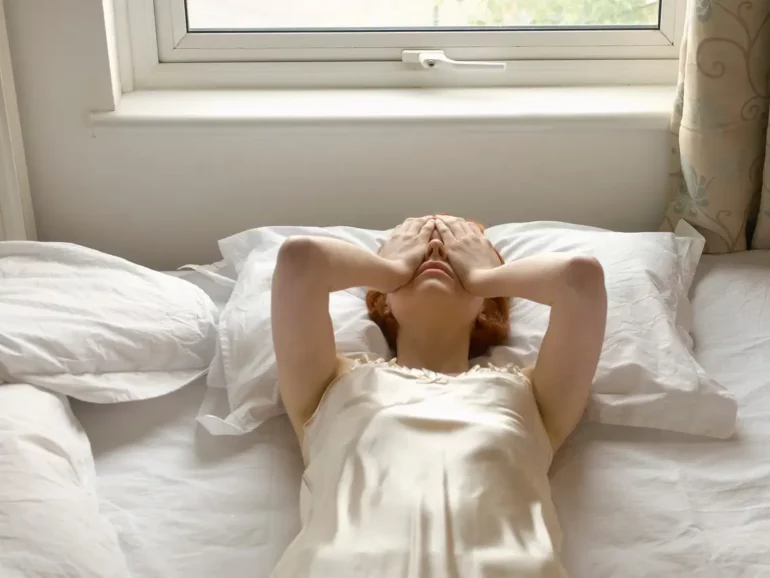Everyone experiences some type of stress or anxiety at some point in their lives.
That stress is usually felt most heavily in the morning, as soon as you wake up.
When you wake up, the pressures of completing your day to day tasks can feel overwhelming, and biologically, your hormones can increase your stress, making you feel worse.
When you wake up with anxiety, you often tend to fixate on the one thing worrying you the most, a presentation, a meeting, etc., and this one thought takes over and doesn’t let you think of anything else.
As soon as your eyes open, you begin to mentally live out your day, attempting to foresee anything that may arise and further trigger your anxiety. You fixate on the worst-case scenario of something important that is happening that day. You reflect on mistakes made the day prior and wonder if anyone will bring them up.
You feel yourself becoming trapped by your responsibilities and commitments.
You criticize yourself before you even start the day.
Ph.D, licensed psychotherapist Mayra Mendez, says it’s common for people with and without diagnosed anxiety disorders to wake up feeling anxious.
Symptoms of morning anxiety can include, but are not limited to a racing heart, shallow or rapid breathing, a feeling of dread or inability to start the day, difficulty concentrating, and fatigue.
While it can be stressful to think about your day ahead, there is a contributing biological process too, the Cortisol Awakening Response (CAR).
Cortisol is known as the stress hormone because it is involved in the body’s response to stress. During the first 30 to 45 minutes that you are awake each day, cortisol levels spike, a phenomenon known as CAR, making you feel more stressed in the morning.
And while anyone can experience morning anxiety, if you’re already prone to anxiety, there can be a high level of anxiousness as soon as you open your eyes in the morning.
Here are some ways to help calm your anxiety in the morning:
Acknowledge Your Anxiety
If you acknowledge your anxiety, it will help you take the proper steps to address it instead of avoiding it and making yourself feel worse.
Recognize the problem to help you face the problem.
Understand that you are not alone, and there is also a biological reason you feel the way you do.
Eat Breakfast
If you wake up with low blood sugar in the morning, which is common after not eating all night, it can cause symptoms that mimic anxiety.
Incorporating foods with magnesium has been shown to help reduce anxiety.
Some magnesium breakfast-friendly foods include:
- Nuts(almonds, cashews, and hazelnuts)
- Bran cereals
- Other whole grains like those in toast and oatmeal
- Fish – including smoked salmon.
Reduce Caffeine Consumption
Research has shown that caffeine can worsen your anxiety, especially if you have been diagnosed with an anxiety disorder.
Try to limit your consumption or opt for black tea instead for an energy boost!
Try To Exercise
Regular exercise can help to regulate your central nervous system and reduce your anxiety.
Yoga or even 10 minutes of walking can help reduce your overall stress levels!
Practice Relaxation
Practicing relaxation techniques can help you have a smoother, stress-free morning.
Some ways to do this are:
- Get up early enough: If you have to rush in the mornings, you will feel even more stressed and anxious. If you give yourself a little extra time in the mornings, you will feel more in control and have the time to practice anxiety-reducing techniques like the ones listed above!
- Meditation: Taking even five minutes to meditate in the mornings can help you feel more relaxed and prepare you for your day!
- Limit TV and Social Media Use: TV and Social Media have been linked to increased anxiety. Try to avoid these in the early morning when cortisol levels are high!
Follow A Morning Routine
Morning anxiety can often make it difficult to get up and start your day. Having a set routine. Even for the first two hours of your morning, having a set routine can help you get started with your day and avoid fixating on negative thoughts.
A routine will also make you feel more in control.
A good morning routine can look like:
- Wake up and eat breakfast
- Exercise or meditate
- Shower
- Get ready
Get Enough Sleep
Avoiding morning anxiety often starts the night before. If you make sure to get a good night’s rest, you will wake up feeling less anxious.
Everyone should aim for about 7 to 9 hours of sleep a night. That can often be difficult with people with anxiety disorders or high-stress levels; establishing good sleep hygiene can help.
Some ways to establish good sleep hygiene are:
- Going to sleep and waking up at the same time every day
- Avoiding TV or your phone leading up to bedtime
- Practice relaxation before bedtime by reading or taking a warm bath
Seek Treatment
If you believe you have an underlying anxiety disorder or your stress and anxiety begin to interfere with your ability to function, you should also seek help from a mental health professional.
Therapy, behavioral changes, and medication can all help manage and reduce anxiety.
Morning Anxiety is a common experience, but that doesn’t mean you have to live with it.
Lifestyle changes like eating a healthy breakfast, exercising, mediation, and good sleep hygiene can all help your anxiety.



